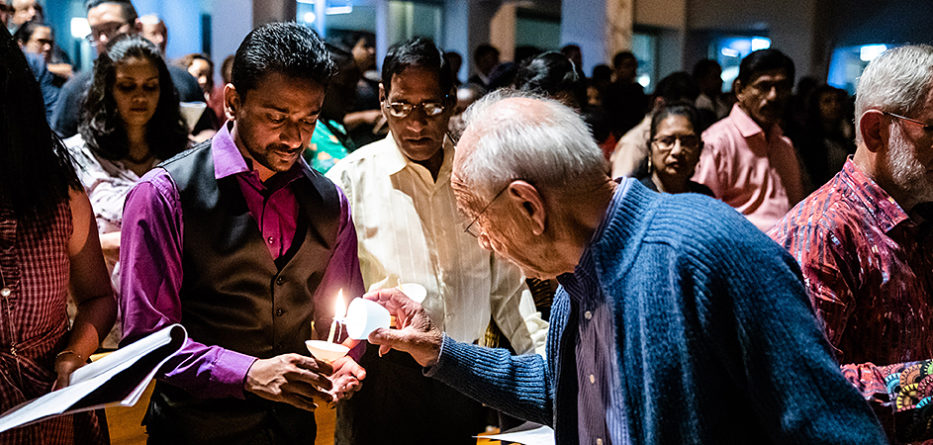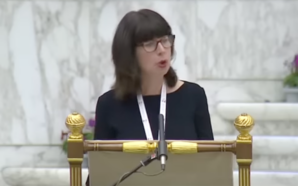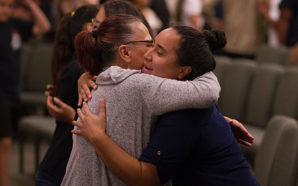Taking off our shoes: A personal reflection on being Church in the 21st Century
By Catherine Whewell
The 21st Century is alive with a hunger for spirituality, for deeper meaning. This hunger is expressed in the explosion of meditation and other forms of spiritual endeavour. To read the world as in only need of God, misses the energy abounding around us that seeks the Divine. Unfortunately, people are not finding what they seek in our Churches as they did previously. Catholic education walks a very fine line between recognising God all around and celebrating that in ways that connect with young people and families, and the expectations placed upon them by parishes who want people to run before they can walk. Meeting Jesus by discovering something of the movement of God as mystery in their lives is a powerful step before people connect mystery in their daily life, with the Mystery of the Eucharist. We forget that God is already with them. Jesus walked with people before they chose whether to join him or not. It also must be said that if people are seeking a community of faith it needs to reflect the joy of being loved, of knowing that we are redeemed, set free, part of God, like the branches of a vine for all eternity. Without disregarding the huge efforts to be welcoming of life-filled priests, deacons, pastoral associates and many lay people, perhaps we might be transformed by stepping out of what we see, to look at what others might be seeing. Our freedom lies in Love, and the truth will set us free. Discerning the truth that the Holy Spirit is guiding us to see, is the work of the Plenary Council convening in October 2021.
What is the Holy Spirit guiding us to see, to reflect upon in faith for renewal and for letting go?
…and to abandon the shoes that had brought (us) here
right at the water’s edge, not because (we have) given up
but because now, (we) would find a different way to tread,
and because, through it all, part of (us) would still walk on,
no matter how, over the waves.
Acknowledged in the Instrumentum Laboris for the Plenary Council are some of the reasons why people are not finding in the Church community the spiritual life they seek. We are on the nose and rightly so. We spoke about love and did harm. We often speak as if there is a package of salvation we control and can administer when people come to us, if they follow the instructions.
The method is the message
Pope Francis has been a liberation for so many looking at the Church because he acts like someone very familiar with Jesus. His method is the message.[1] What he does and who he prioritises points to how Jesus acted and what he said. There is integrity in the message. There is synergy between what Pope Francis says and what he does. There isn’t a great divide between the words of love, mercy and compassion and the Pope’s actions and preoccupations. In this coherence, people can see that the message of the Church looks and feels like Jesus in the Gospels. Pope Francis has shifted where he stands and sees the world and the Church differently as a consequence. Even as Supreme Pontiff, he stands with the poor, the outcast, the earth, and he looks through those eyes for renewal in the Church.
So many times, in my work in the Church, which was a gift and a privilege, I saw that people of good heart and love place the Church at the centre of the universe. Fr. Jose Marins[2] described the Church as a solar system: the leaders are like the sun, serving those who are known members of the worshipping community and the groups of the local parish or diocese who are the planets revolving around the sun. The next group, in his conception of this allegorical cosmos, were the comets, visiting for an occasion, Christmas, Easter, Baptisms, Weddings and Funerals. Sadly, the comets are often spoken of as deficient. Lacking the true desire for that which they asked from the Church. Often, we do not have any curiosity about how God has already been moving in their lives; nor did we listen to their ‘griefs and anxieties, joys and hopes’ and thus find an ‘echo in our hearts’.
If we are to be renewed by the Holy Spirit, it will be because we took off our shoes at the edge of the water, and stepped out, not knowing where, but trusting that we are being held as we walk on water, going where we are led, not where we planned.
Walter Kasper said that “Eucharist can only be the source and summit of our lives, if it is not the only form of communion.” Deciding the new rubrics for inclusion of the laity in decision making, considering the future shape and inclusion or rejection of the Third Form of the Rite of Reconciliation, considering our mission to a world where we only see need, re-forming our rituals to be in more inclusive language at the very least, are important. But they are not the main work of the Plenary. The main work of the Plenary is to show integration between message and method, risking all we know so that we can finally step out and walk on water, trusting that we will be held up by Christ’s saving love (https://havenlight.com/collections/yongsung-kim/products/the-hand-of-god-by-yongsung-kim?variant=36720650191012)
Peter stood in another place and saw Jesus differently and for a while walked on water. If we could only step out of this leaky boat and onto the water, instead of adding another patch, we too may see Jesus differently. A model to follow would be something akin to Pope Francis taking Holy Thursday Mass out of the Vatican and into a prison, or the Cardinal Archbishop of Paris, Jean-Marie Lustiger, inviting the poor and homeless to Midnight Mass for the new millenium, rather than the fed and housed who would normally be there. Symbols of course are empty if they are not part of a wider work. Symbolic action is the Church’s forte. Our symbols need to speak and to be immediately understood, as were these two actions. The two examples above connected with what people know of Jesus. They carry Jesus in their message to the whole world. Our symbols need to be deeply human, rather than deeply traditional.
It may seem that I am suggesting that the rich traditions of the Church hold no meaning for me. On the contrary, as I have grown in faith, they have become even more important to me, especially the celebration of the Eucharist. I am suggesting that these traditions be infused with and come from a place of love for each other and for the world, rather than being somehow holier than the lives they meet and in need of protection from those very lives. For example, if, in the words of David Whyte’s poem, we sort what we need as we step out over the waves, then let us take the heart of the Sacraments and bring them into dialogue with people’s lives, so that they speak to their lives, instead of wondering if the people standing at the altar are worthy of what they are receiving (families bringing children for Sacraments are a case in point).
Let us shed what is not love and let go of what is in need of letting go: our fears; our holding tight to things, symbols and practices that are so heavy with history that they will drown us as we try to walk over the waves. Like Peter, it is faith that enabled him to step out of the boat and when that failed, Jesus saved him. That is our story at this moment in history. With our eyes firmly on Christ, let us take off our shoes and step out onto the waves in faith and confidence so that when we finally realise that we have nothing but the Good News, we too will be saved.
Read Part One here.
Read Part Two here.
Catherine Whewell was Director of People in Ministry and Chancellor in the Catholic Archdiocese of Adelaide. Cathy now works as a leadership coach, specialising in social and emotional intelligence and managing conflict as the space of possibility, via Teams or Zoom or other forms of virtual communication.
[1] Fr. Jose Marins, a priest from Brazil, was commissioned by the Bishops of South America to create Basic Ecclesial Communities. His team travelled the world and a key concept they modelled was “The method is the message.”
[2] Fr. Jose Marins Team used the Solar System as a parable for the Church’s relationship with the baptised and the world in which the Church preaches the Good News.








